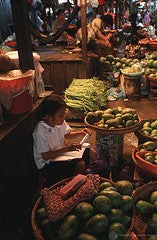
These are only some of the questions that a key World Bank-IMF report is delving into as it provides an annual assessment on progress towards the Millennium Development Goals (MDGs) as well as the challenges which developing countries face in achieving them.
Each year, the Global Monitoring Report (GMR) focuses on a special theme that is particularly pertinent. With the surge in international food prices in the second half of 2010 provoking concerns of a “second food crisis”, the focus of GMR 2012 is on how food price developments affect the ability of countries to make progress towards the Millennium Development Goals. Since the first food price spike in 2008, a range of research has pointed out that higher food prices actually increase poverty and harm human development, in particular of young infants, as the quality of food intake takes a hit when food prices rise.
Indeed, higher international food prices do not necessarily mean that farmers around the globe are better off. Much depends on if farmers themselves are net sellers or net buyers of food. For workers on commercial farms it depends if their wage income rises more than their cost of food. This very much depends on local labor market conditions. Certainly if the owner of the commercial farm worries that the price increases are temporary, he or she will be reluctant to increase wages. Increased volatility and thus the difficulty for the commercial farmer to distinguish between a temporary increase versus a permanent increase in food prices will not help him or her make the decision to increase wages, certainly not if he or she expects that wages are downward sticky.
An interesting issue is that higher international food prices do not always translate in increases of the same magnitude of domestic food prices. For example, local and/or regional markets can be rather insulated from world markets, exchange rate movements can dampen the transmission, and/or local eating habits can be such that the food consumed has no direct world market equivalent.
Notwithstanding, the bottom line seems to be that more people fall into poverty then leaving poverty, and nutritional outcomes deteriorate when international food prices rise and/or behave more erratic. So the question becomes how to respond? Are there general lessons to be learnt? It is probably important to distinguish policy remedies at the global or regional level, from policies at the country if not community level. To have freer market access around the globe can have or should I say will contain the magnitude of swings in food prices from shocks as they get shared over a larger market of food products. Hence, while export bans might have a dampening effect in the country implementing them they export the volatility to the remaining countries that are part of the so-called world market. At the same time dealing with the access issues in OECD countries, could enlarge the market and reduce volatility as well.
However, what to do at the country and even more at the community level is much more dependent on local conditions, for example, am I living in a rural or urban household, am I a net buyer or net seller of food, do I have a wage job or am I engaged in subsistence farming? It is not that easy to generalize favorable policy responses at the country or community level. Although some lessons are emerging, in particular regarding the need to work at the country level through social safety nets and have a policy environment that allows for if not supports a supply response.
How people have coped with higher and more volatile food prices at the community level is less clear. As lead coordinator of GMR 2012, I would like to invite you to contribute to the report by providing the GMR team with your experience on how local communities in the developing world have coped with higher and more volatile food prices. Our plan is to include the most compelling stories in the report itself as well as disseminate them through the GMR website. So please do send us your experiences on this important topic by writing to us at gmr@worldbank.org.


Join the Conversation